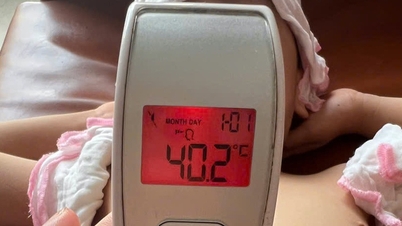But a new study published in the Journal of Applied Physiology suggests the impact goes even deeper: Dehydration can spike levels of the stress hormone cortisol by up to 50 percent, causing the body to overreact to everyday stresses.
New research shows the serious impact of water shortages on human health
The study was conducted by Liverpool John Moores University (UK) to investigate the link between hydration levels and physiological responses to stress.

Need to replenish water when exercising, in hot weather or when the body is dehydrated due to illness
ILLUSTRATION: AI
The authors divided the participants into two groups: One group drank less than 1.5 liters of water per day; the other group drank the recommended amount of water — about 2 liters for women and 2.5 liters for men.
After a week of maintaining their normal routines, the volunteers were asked to participate in a simulated stress test, including a mock job interview and a quick-thinking math problem - two situations designed to stimulate the natural stress response, according to Scitech Daily.
The results showed that the dehydrated group had blood cortisol levels that were 50% higher than the well-hydrated group. This is clear evidence that dehydration not only affects physical performance but also increases the body's biological response to stress.
Why does dehydration increase stress?
Researchers explain this phenomenon is related to the hormone vasopressin - which is usually secreted when the body is dehydrated to retain water.
However, vasopressin also activates the stress processing center in the brain, leading to a sharp increase in cortisol - the main stress hormone. This means that when the body is dehydrated, the brain automatically "alarms" as if it is in danger, making you more likely to feel stressed even when the situation is not really serious.
Tips for staying hydrated
According to scientists , simply staying hydrated can help the body better control its stress response, especially during times of stress.
Scientists recommend some simple hydration habits that help reduce stress naturally:
- Drink water regularly throughout the day, especially before stressful situations.
- Monitor urine color: Light yellow indicates adequate hydration.
- Eat plenty of water-rich foods such as fresh fruits and vegetables.
- Replenish water during exercise, hot weather or when the body is dehydrated due to illness.
Researchers concluded: Staying hydrated not only helps the body stay healthy but also helps the mind be more resilient to stress. In an era of constant pressure, a bottle of water can be the "secret weapon" to help you balance and be more resilient every day, according to Scitech Daily.
Source: https://thanhnien.vn/phat-hien-moi-dieu-gi-xay-ra-khi-co-the-thieu-nuoc-185251012142525132.htm





![[Photo] Solemn opening of the 1st Government Party Congress](https://vphoto.vietnam.vn/thumb/1200x675/vietnam/resource/IMAGE/2025/10/13/1760337945186_ndo_br_img-0787-jpg.webp)






























![[Photo] General Secretary To Lam attends the opening of the 1st Government Party Congress](https://vphoto.vietnam.vn/thumb/1200x675/vietnam/resource/IMAGE/2025/10/13/1760321055249_ndo_br_cover-9284-jpg.webp)






































































Comment (0)